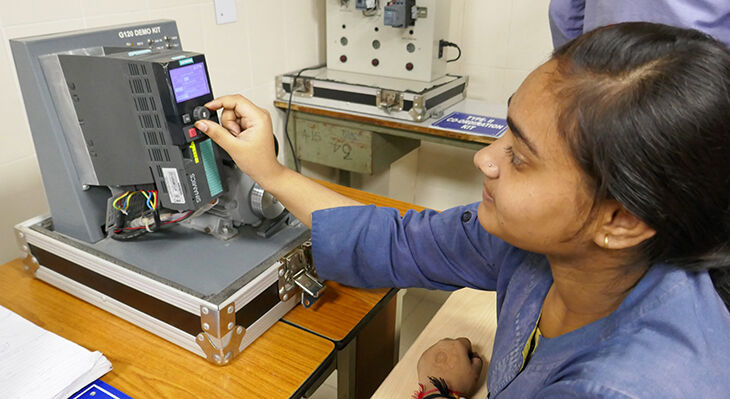Newsletter on Indo-German VET cooperation
GOVET and the National Skills Network (NSN) from India run a joint newsletter series. It focuses on core topics of vocational education and training in both countries and the bilateral VET cooperation of BMBF.

In Germany, vocational education and training (VET) ensures that future members of the skilled workforce are equipped with high-level specialist, methodological and social competence, and thus it lays the essential foundation for an innovative and competitive economy. Companies can train their skilled workers to fit their needs. Skilled workers, who were trained in a company, know its corporate culture. German vocational training and in particular the Dual VET system is worldwide seen as a success model. Therefore, many countries are interested in the German Dual Model. India has been a strong advocate of the German Dual Model and efforts are made to establish a Dual system in the Indian context.
Over the next six months, GOVET and NSN will publish articles, interviews and updates that inform and educate about the German Dual VET system and the bilateral VET cooperation of the German Federal Ministry of Education and Research (BMBF) with India. Key topics include the five core elements of the Dual system which form the pillars of the successful framework, the impact of digitalisation on VET and the scope for industry engagement through apprenticeship. The articles can be found in the section "Stories from our Partner Network" of "Skill Times".
-
Skill Times, 10 April: In the section "Stories from our Partner Network" you will find an article on German Dual VET and Indian Skill Development, jointly written by GOVET and NSN.
Another main topic of the Newsletter in general are the challenges that COVID-19 poses for Indian vocational training on the one hand and the professional world on the other hand.
Read the NSN Newsletter -
Skill Times, 23 April: In the section „Stories from our Partner Network“ GOVET and NSN provide a Skill Talk with Dr. Raj Dravid (EcoDev Foundation) on what India can learn from the German Dual VET system.
Read the NSN Newsletter -
Skill Times, 7 May: The Federal Ministry of Education and Research (BMBF) has been actively cooperating with India in the field of VET since 2008. In this issue you can gain an insight into the VET cooperation activities of BMBF.
Read the NSN Newsletter -
Skill Times, 21 May: In this issue NSN highlights a potpourri of topics that are relevant to Indian vocational training: How could COVID-19 be a game changer in the field of VET in India? How can apprenticeships be made more attractive for enterprises and SMEs? Moreover, NSN presents the work of GOVET. This marks the start of the series of portraits on the BMBF's initiatives in vocational training (iMOVE, GIIVET, SINADE, QualIndia will be following).
Read the NSN Newsletter -
Skill Times, 3 June: A portrait of iMOVE and its initiatives in vocational education and training and opportunities for partnerships is provided in this issue.
Read the NSN Newsletter -
Skill Times, 18 June: In this issue NSN presents the work of SINADE and its cluster-level approach to implement Dual VET.
Read the NSN Newsletter -
Skill Times, 9 July: This issue focuses on the topic of certificates. NSN presents the work of GIIVET - a project which establishes whether and how it is feasible to sustainably implement and certify Dual VET oriented at the German standard.
Read the NSN Newsletter -
Skill Times, 23 July: How can quality in Indian VET institutions be measured comprehensively? This is the primary research question the BMBF funded project QualIndia focuses on.
Read the NSN Newsletter -
Skill Times, 6 August: In this issue iMOVE explains why qualified VET staff is important and presents cooperation possibilities with German training providers.
Read the NSN Newsletter -
Skill Times, 20 August: A new block of topics starts and focuses on digitalization. In a first overview, GOVET will show the challenges digital technologies mean for vocational training, which skills will be in demand in the working world of tomorrow and how companies can make their trainees fit.
Read the NSN Newsletter -
Skill Times, 3 September: Open Educational Resources (OER), openly licensed teaching and learning materials, are becoming more important than ever in the COVID-19 crisis. In the current issue of Skill Times you may find an interview about how OER bring more sustainability in freight forwarding and logistics.
Read the NSN Newsletter -
Skill Times, 17 September: In this issue iMOVE shows exemplary company cases making use of innovative methods and emerging technologies.
Read the NSN Newsletter -
Skill Times, 25 September: This special edition fcouses again on the VET cooperation activities of BMBF presenting GIIVET, iMOVE, SINADE and QualIndia.
Read the NSN Newsletter